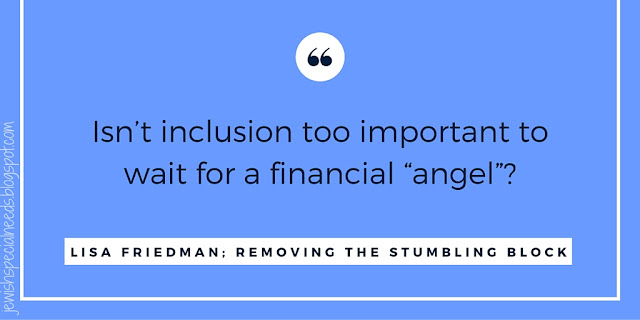In my previous post, Affording Inclusion – Part 1, I began to explore the necessity of financially supporting inclusion in religious schools and synagogues.
 I shared that the most commonly asked question when I lead a
presentation is: “How do you afford it?” My standard reply: “How can we afford NOT to support inclusion?”
I shared that the most commonly asked question when I lead a
presentation is: “How do you afford it?” My standard reply: “How can we afford NOT to support inclusion?”
Isn’t it essential that we make inclusion a reality
regardless of our means?
So if we agree…if we all say, YES, and truly mean it; then let’s get down to business.
So if we agree…if we all say, YES, and truly mean it; then let’s get down to business.
Here are some practical, inexpensive and realistic ways
to begin to make inclusion an affordable reality for your congregation:
A huge part of inclusion is attitude; and changing
attitudes is free.
It’s hard work. It
takes genuine commitment. But it is
free. Start small. Learn about person-first language. Change the way you speak, change the way your
teachers, madrichim (teen teaching assistants) and clergy speak. Change the wording on all your forms,
letters, and school and synagogue communications. Make this one conscious change and see it
through. Then reflect on what this
change has brought to your community.
Invest in professional development opportunities for your
teachers and madrichim.
This is where I think you can get your biggest bang for your
buck. Almost every religious school I
know has some budget for professional development. Bring someone in to lead a full-day or a
half-day workshop for teachers and madrichim. Extend the learning by gathering to discuss
student case studies and apply what you have learned. Meet more frequently with teen assistants to
support them. Maintain the learning with
in-person or virtual check-in opportunities throughout the year.
Use your synagogue’s existing tools and structure to promote inclusion.
Make inclusion a synagogue-wide priority. Encourage clergy to offer sermons about the
value of inclusion. Select texts to
study together at weekly Torah study, in committee meetings or at special
programs. Write about inclusion in your
weekly newsletter and highlight success stories in your monthly
newsletter. Incorporate lessons on
disability awareness, tolerance and acceptance in religious school classes and
at youth group events. Form an Inclusion
Committee to delve into the issue more deeply.
Never miss a post from Removing the Stumbling Block:
Do one thing and you are one step closer to inclusion.
Never miss a post from Removing the Stumbling Block:




